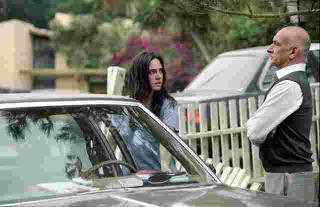One of my new resolutions is to use this space as a depository for my impressions of the various books and films that I process. I “consume” rather a lot, and before now I have very rarely committed my impressions and thoughts to more concrete form – the impressions become silt sinking down through the waters of my consciousness ending up as the more or less stable deposit of mud which represents my mind.
But I think that’s a bad habit. It’s a habit deeply ingrained – I was one of those annoying people at school who would never ‘show working’ but always came up with the right answers to the maths questions…
And I think it would be a good habit – a good discipline – if there was more ‘output’ to correspond to the various inputs. So, with that out of the way, for the first and last time, let’s begin.
Last week I watched ‘House of Sand and Fog’, a remarkable film with Ben Kingsley and Jennifer Connelly. Possibly the most depressing film I have ever seen, so I’m not sure it would be fair to say that I ‘enjoyed’ it, but the story and the images have stayed in my mind.
The plot revolves around the sale and purchase of a house overlooking the Pacific near San Francisco. At the beginning of the story we see Connelly kicked out of the house by bailiffs because of non-payment of a business tax. As the story unfolds it becomes clear that, to a large extent, Connelly is innocent, and should not have been evicted. Connelly, in fact, is a victim – abandoned by a husband, she is lost in a ‘fog’ of grief and misdirection, driven primarily by immediate emotions.
However, the council sell her house to the Kingsley character – an emigre colonel who fled Iran following the Khomeini revolution, and who has built up a life for his family in the United States. He purchases the house, principally to make money, but also to ‘redeem’ certain failures in his own past. He is a strong-minded, principled and extremely proud man – abrasive, like sand.
There follows a slow building conflict between Connelly and Kingsley over who has the ‘right’ to this house of sand and fog, which conflict escalates, draws in bystanders, and ends in an unbearably tragic outcome. (I told you it was depressing).
What I have been musing mostly about is the nature of sin, and that here is a portrayal of people and community crying out for the word ‘forgive’ to be spoken. Connelly is the principal actor provoking the tragic outcomes, in a certain sense it is all ‘her fault’, even though it is unwitting. The moral vacuum within her provokes chaos and destruction around her.
There is no redemption in the story, no straws to grasp representing the possibility of hope. It is a portrayal of the outworking of ‘karma’, where actions taken sometimes a great many years previously work out their consequences remorselessly, and the human beings involved become mangled by the machinery.
The film portrays a group of people in whom the law of sin and death is dominant, and where grace is absent. The film doesn’t glorify karma (in the way that, eg, a Schwarzenegger film might do), it simply portrays it convincingly and realistically.
So: a very dark film, but also a very good one. It lingers in the mind.
(I enjoyed writing that. I’ll have to do it more often.)

